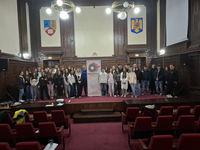WHAT WE DO > European projects > Current projects > REVIVE > VERA 2025 > Training on Gender equality in CSO leadership (Boards)
Gender equality in CSO leadership (Boards)

After centrally organised training of trainers by CEV, online and offline cascaded training activities in Member States are being co-organised with CEV Members on “Gender equality in CSO leadership (Boards)”.
This training session has been developed under the CERV Operating Grant Framework Agreement “REVIVE” (Revealing European Values in Volunteering in Europe) and the 2024 Specific Agreement “Volunteering, Equality, Rights and Action” (VERA 2024) as pilot training. The aim is to strengthen the capabilities of member organisations and other stakeholders in enhancing gender equality in leadership roles (Boards). By focusing on identifying barriers, exploring equity strategies, and addressing specific organisational challenges, this training seeks to support Volunteer organisations in fostering a more inclusive and effective leadership environment. The materials have a particular focus on the increased inclusion of women, but also highlight the importance of an overall inclusive approach and encouragement to also consider the issue from a less binary position.
Although Civil Society and Volunteering in general is often perceived as inclusive, data reveals significant disparities in participation and leadership roles. Factors such as gender, socioeconomic status, education, and social networks contribute to this imbalance, with women facing fewer opportunities for managerial positions, mirroring broader societal gender inequalities (Kristiansen, 2002; British Council, 2016).
Gender-diverse leadership can bring significant advantages to organisations. When gender equality is not prioritised, organisations miss out on the benefits of varied leadership styles, innovative ideas, and enhanced effectiveness.
Organisations that overlook the importance of gender balance in leadership roles risk reinforcing existing disparities and missing valuable opportunities. Persistent systemic challenges—such as institutional biases, inadequate mentorship, and insufficient support systems—can hinder the advancement of women into leadership roles. These issues not only affect organisational dynamics but also perpetuate broader societal inequalities.
Moreover, the lack of female representation in leadership roles affects societal perceptions of women as leaders and role models. This underrepresentation limits the visibility of women’s leadership capabilities and impacts future generations' aspirations. To address these challenges effectively, organisations need to adopt comprehensive strategies that promote gender equality and dismantle existing barriers.
CEV Members implemented 31 trainings so far.
A total of 820 participants (249 male, 561 female & 10 non-binary) in 12 countries took part:
Romania (RO) - 13 February 2025 with 39 participants Slovakia (SVK) - 29 May with 20 participants
Latvia (LV) - 14 March 2025 with 11 participants Ireland (IE) - 22 May with 5 participants
Malta (MT) - 29 & 30 April 2025 with 34 participants Croatia (HR) - 15 of April and 9 of May with 34 participants
Italy (IT) - 10,14 and 20 May with 108 participants Belgium (FR) - 19 of June with 21 participants
Belgium (FR) - 13 of May with 30 participants France (FR) - 9 of December with 12 participants
Hungary (HU) - 25, 26 and 27 of November with 46 participants Hungary (HU) - 16 of September with 6 participants
Ireland (IE) - 22 of May with 5 participants Italy (IT) - 7 of November with 35 participants
Italy (IT) - 28 of November with 27 participants Italy (IT) - 2 of December with 16 participants
Italy (IT) - 15 of November with 31 participants Italy (IT) - 6 of November with 35 participants
Italy (IT) - 22 of May with 35 participants Italy (IT) - 13 of June with 35 participants
Italy (IT) - 21 of June with 23 participants Portugal (PT) - 17 of October with 32 participants
Portugal (PT) - 5 of June with 52 participants Portugal (PT) - 19 of November with 56 participants
Spain (ES) - 19 of September with 20 participants Spain (ES) - 7 of October with 23 participants












